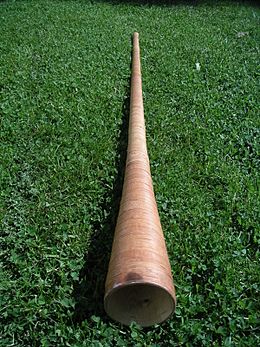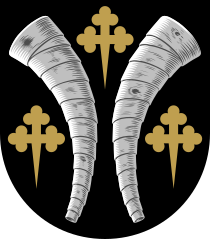Birch trumpet facts for kids
The birch trumpet (Norwegian: neverlur, Swedish: näverlur, Latvian: tās̆u taure, Lithuanian: ragas, daudytė, Finnish: tuohitorvi, Estonian: karjapasun) is a type of natural trumpet made of spruce covered with birch bark, known in Norway, Sweden, Finland, England, Denmark, Latvia, Lithuania, Belarus and Estonia. Even cruder and less durable versions were made of plain birch bark. They are associated with the early European Chalet culture, where it was presumably used to intimidate predators, frighten supernatural enemies, and convene council meetings.
Usually, the neverlur is a natural horn, having no fingerholes or valves. Normally, a player can play 10 tones from the natural scale on the instrument. In the modern era, the neverlur is primarily a cultural curiosity, used for the occasional fanfare.

In Finland, the birch trumpet, locally known as the tuohitorvi, comes in different varieties. Some instruments are built as natural horns and used for signalling, usually by shepherds, whereas others are built in the style of the mute cornett and have fingerholes for melody playing.
Tolga kulturskole (culture school) in Norway regularly teaches playing the neverlur to all interested people living in the municipality.
The oldest recovered näverlur in Sweden dates back to the 10th century, and resembles earlier bronze trumpets.
Contemporary manufacturers
Norway
- Magnar Storbækken at the company Naturinstrumenter in Tolga
Sweden
- Rune Selén was Sweden's best known näverlur manufacturer. He manufactured more than 11000 näverlurar between 1959 and 2005 when he retired because of dust allergy. He died 28 October 2011.
- Lisa Byers Runberg in Alunda. She was taught by Rune Selén. Her husband Per Runberg is a folk musician and riksspelman.
- Jan Nordkvist at the company Lurmakaren in Tällberg
- With length up to 4–5 meters are known from the Alps (alphorn), Carpathian Mountains, and Pyrenees.
- Midwinter horn mainly known from the border area between Germany and Netherlands in Bentheim and Twente. It is only played in the period between Advent Sunday and Epiphany
- Büchel (Switzerland)
- Ligawka (Poland)
- Karjapasun (Estonia)
- Trembita
See also
- Lur




